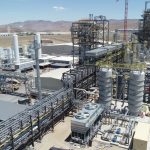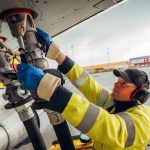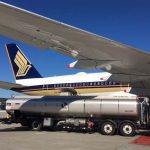United Airline’s recently-launched UAV Sustainable Flight Fund has made its first investment: $5 million in algae biofuel company Viridos, which is using bioengineering technology to convert saltwater algae into sustainable, low-carbon jet and diesel fuel. In total, the California-based company, formerly known as Synthetic Genomics, has raised $25 million in a Series A equity investment round led by Breakthrough Energy Ventures (BEV) and joined by Chevron and United Airlines Ventures (UAV). The funding will be used for R&D to further increase algae oil productivity to reach commercially deployable levels. Viridos claims its bioengineering of microalgae has already achieved seven times the oil productivity compared to wild algae and says sustainable aviation fuel made from its oil is expected to have a 70% reduced carbon footprint. Over a decade ago, algae was touted as a highly promising SAF feedstock and was used in both commercial and military aircraft demonstration flights but fell out of favour over difficulties in scaling up the technology and poor economics.
However, Viridos says its technology, when combined with optimised production processes and systems, will enable large-scale algae production that far exceeds any traditional oil crop and achieve high algae oil output in comparatively small areas. The algae are grown in vessels containing seawater, which allows for contained deployment in hot and dry locations without taxing scarce freshwater and arable land resources. The company claims the algae have “extremely high” oil content and of a quality that allows existing biorefineries to process the oil with high yields.
Last year, Viridos was one of eight successful applicants to be awarded a California Competes Grant, which aims to incentivise businesses to choose California for investment and to stimulate the creation of quality, full-time jobs in the state. The company said the grant would allow it to create 70 high-paying professional jobs and bring nearly $75 million in investment to the Imperial Valley area in Southern California, where Viridos has an outdoor pilot programme, the California Advanced Algal Facility.
“By establishing production sites to grow Viridos-engineered microalgae in saltwater, we are creating the foundation for a biofuel future that moves away from fossil fuels without competing for precious resources such as fresh water and arable land,” commented Viridos CEO Oliver Fetzer. “We are excited to have the support from BEV, Chevron and United Airlines. Together, we can build the ecosystem needed to bring algae biofuels to the market. We look forward to bringing our oil-producing algae to commercial readiness and then growing them to produce scalable quantities of SAF and renewable diesel.”
Responded Breakthrough Energy Venture’s Carmichael Roberts: “Oliver and his team have a promising technology for converting algae into sustainable liquid fuels. The science behind their platform positions them to crack the code on the critical barriers to scale, making Viridos an important addition to our portfolio.”
BEV is a group of investors led by Bill Gates that has raised more than $2 billion in capital to invest in over 90 climate technology companies that have the potential to reduce greenhouse gases at scale. These include Heart Aerospace, the Swedish electric airplane maker, in which United Airlines has also made an investment as well as ordering 200 of its ES-19 aircraft, and ZeroAvia, which is developing hydrogen-electric powertrains for regional aircraft.
To date, United has invested in the future production of over three billion gallons of SAF, which the airline says is the most by any airline in the world.
“As the global aviation leader in SAF production investment, United remains committed to reaching net zero carbon emissions by 2050, without relying on traditional carbon offsets,” said Mike Leskinen, President of United Airlines Ventures. “Viridos’ algae-based biofuel technology has the potential to help solve our supply problem without the need for farmland or other agricultural resources and marks our inaugural investment in our new cross-industry UAV Sustainable Flight Fund.”
A year before its merger with United, Continental Airlines became the first US carrier to conduct a demonstration flight using sustainable aviation fuels when in January 2009 a Boeing 737-800 flight used a 50% blend of an algae-based (it was mixed with oil from the jatropha plant) fuel in one of its engines. In June 2011, the US Navy demonstrated a 50% blend of algae-based jet fuel produced by Solazyme, which was followed that November by a United Airlines flight from Houston to Chicago on a 40% blend of Solazyme’s algal jet fuel, so becoming the first US commercial flight powered in part by algae-based biofuel.
However, hopes of a breakthrough at the time in the use of algae as a SAF feedstock did not materialise. In 2016, Solazyme changed its name to TerraVia, with a change of focus away from fuels to food, nutrition and personal care, before filing for bankruptcy protection the following year. Sapphire Energy, another US algae-based company, supplied its Green Crude oil for the 2009 Continental flight. In 2019, it sold off its Integrated Algal BioRefinery to Green Stream Farms, which used it to grow algae for use in nutritional products and livestock feed.
“The story of algae-based SAF offers an interesting case study in the kind of obstacles that have delayed the decarbonisation of aviation,” says a blog by industry body the Algae Biomass Organization. “A decade ago, there was a frenzy of interest in algae for fuel that stirred up investments and lofty promises by a number of startups – all based on very exciting, but also preliminary, technical analysis of how efficiently algae could be used to turn sunlight, water and fertiliser into fuel. Unfortunately, those promises gave way to delays, then frustration, and finally outright scepticism on whether the fuels would ever work.
“Yet over the past ten years, the algae industry has quietly been overcoming the hurdles. There has been no single breakthrough to make headlines. Instead, dozens of new innovations across the board have improved efficiencies, streamlined processing and boosted production facilities. This iterative technical progress is showing real results. The emergence of algae as a highly productive, innovative agricultural crop offers an opportunity of scalability and carbon efficiency that is poised to make a dent.
“Beyond pure yield, the biomass composition of algae feedstocks, with over 50% of its weight as carbon, becomes an attractive feedstock for the production of fatty acid and ethanol-derived SAF. Based on a recent resource and sustainability assessment of nationwide algae production potential, projections estimate that over 20 billion gallons of SAF could be produced across a collection of 1,000 large algae farms, considering highly productive agricultural deployment across non-arable land.”
Photo: In 2011, United Airlines operated the first commercial flight to use algae in its fuel
















More News & Features
Lessons learned from the collapse of Fulcrum BioEnergy
Early data shows uncertainty that UK SAF mandate can be met in its first year
Swiss advanced SAF technology startups Metafuels and Synhelion reach project milestones
PtX fuels have significant Asia-Pacific potential but face many barriers, finds report
Airfreight giants DHL Express and FedEx announce big US SAF deals
Asia-Pacific study reveals pessimistic outlook for SAF uptake by 2030 as Singapore details levy